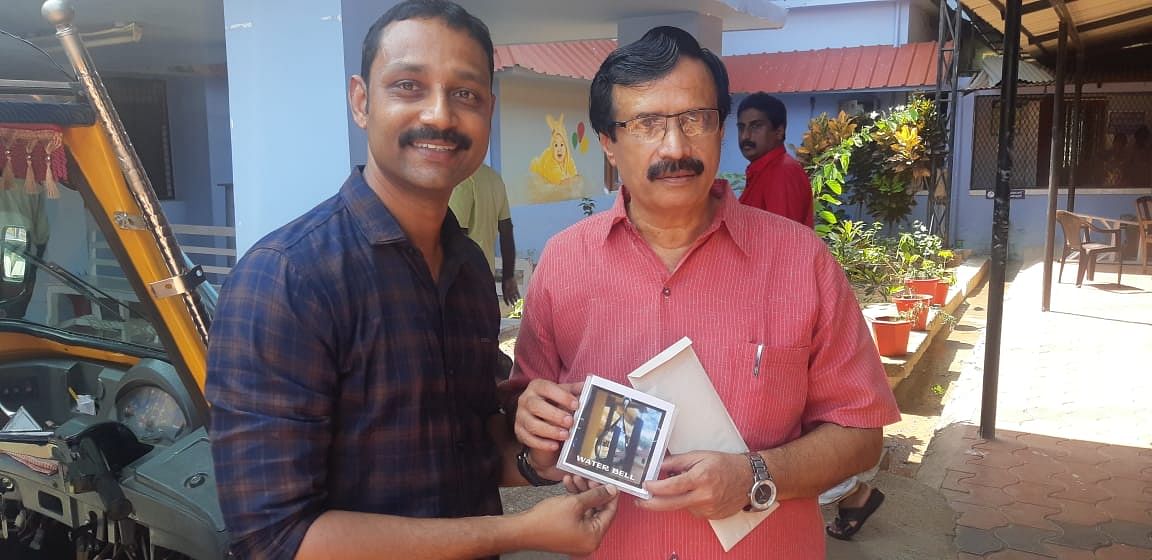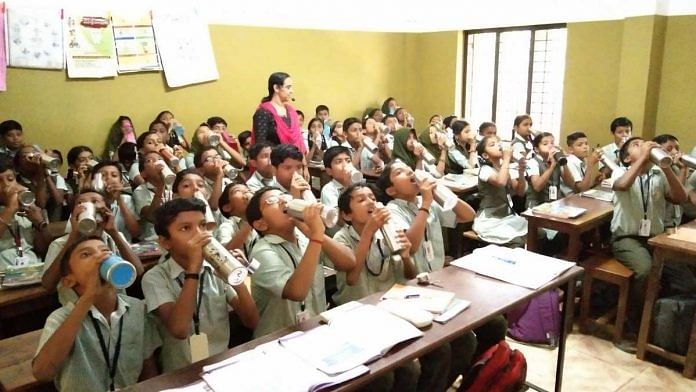Bengaluru: Kerala has been in news of late for a good health practice initiated by some of its schools — ringing a bell thrice in the day to remind students to drink water. Following in its footsteps, Karnataka and Telangana have now decided to introduce the concept in all government schools in the two states.
Karnataka’s Primary Education Minister Suresh Kumar announced last week that all government schools will have a water bell that will ring three times during school hours to remind students to consume water.
“The bell will ring at 10.35 am, at noon and at 2 pm every day to remind students to drink water. During these breaks, which will last for ten minutes, teachers will instruct kids to drink water and advise them why it is important to keep their body hydrated,” Kumar told reporters at a press conference.
In Telangana, Education Minister P. Sabitha Indra Reddy issued a directive to all district education officers last week to implement the ‘water bell’ concept in schools immediately.
Indraprastha Vidyalaya, a private school in Mangaluru’s Uppinangady town, was the first school in Karnataka to implement the ‘water bell’ model under which three water breaks are given.
School principal Jose M.J. said they had received complaints from parents that their children would return home with full or half-filled water bottles.
“We began receiving complaints from parents that children were returning home with their water bottles full. So we decided to implement the ‘water bell’ (model) to ensure that they drink water,” he said.
Speaking to ThePrint, Commissioner for Public Instruction K.G. Jagdeesha said the education department is in the process of planning a two-part system to introduce the concept in schools.
According to the department, the bell will ring thrice and a circular will be issued to that effect in urban areas where children carry water bottles to schools. However, children in rural areas do not carry water bottles and, therefore, a 10-minute break will be given so that students can go and drink water, Jagdeesha said.
“It is not compulsory to drink water every time the water bell rings. It is just a reminder to drink water. If one child drinks or sips water then others also will be inspired to take a sip. That’s what we are aiming at,” he added.
Also read: This World Water Day, remember, a cup of coffee takes 130 litres & meat’s a guzzler
Water bell concept was initiated in Kerala 2 years ago
The ‘water bell’ concept was first initiated two years ago in Kerala’s St Joseph’s Upper Primary School, located in Irinjalakuda, by its physical education teacher Jenil John.

John, a former national-level handball player, told ThePrint the idea struck him when he found that children were often going on sick leave due to infections or fever. The root cause turned out to be dehydration, he said. John then decided to shoot a video in the school as he went around asking students to drink water for the camera. “Seeing the camera, they were compelled to drink.”
He said the video also had a message about the importance of water consumption.
“The video was of a boy who faints after not drinking water despite feeling thirsty. He develops a severe stomach ache and a water bottle provided by the teacher and a school announcement makes the child realise the importance of drinking water. That is when we thought why not introduce a water bell just before the interval,” said John.
“We also noticed that girls were not drinking enough water so that they don’t need to go to the toilet. That was causing them more health issues,” he added.
John is now absolutely thrilled that his idea has had such a far-reaching impact — with the Karnataka and Telangana governments deciding to implement it.
“I am thrilled to see that the concept that we introduced two years ago has received such wide appreciation. I have received calls from doctors, who have applauded this move,” he told ThePrint.
‘A body clock is better than a water bell’
Speaking about the concept, Karnataka Associated Management of Schools general secretary Shashi Kumar, however, raised an issue.
“When you are introducing water breaks in between classes, it is also important to address infrastructure and water facilities in schools. There are schools, especially in rural areas, that don’t have washroom facilities. Girls, especially, will find it difficult if basic amenities are not provided,” he said.
Others believe the concept of reminding children to drink water is important, but forcing them to drink at a particular time may not be the best thing.
“It is a good concept, but children should be aware when to drink water when their body needs it. A body clock is better than a water bell,” said M. Srinivasan, president of Management of Independent CBSE Schools Association.
Srinivasan feels instead of having a bell that reminds children of drinking water, it is better if schools allow children to drink water anytime during classes, which is not allowed at present.
Also read: Snoop on school bags for ‘anything red’ — Valentine’s Day diktat for Karnataka schools



